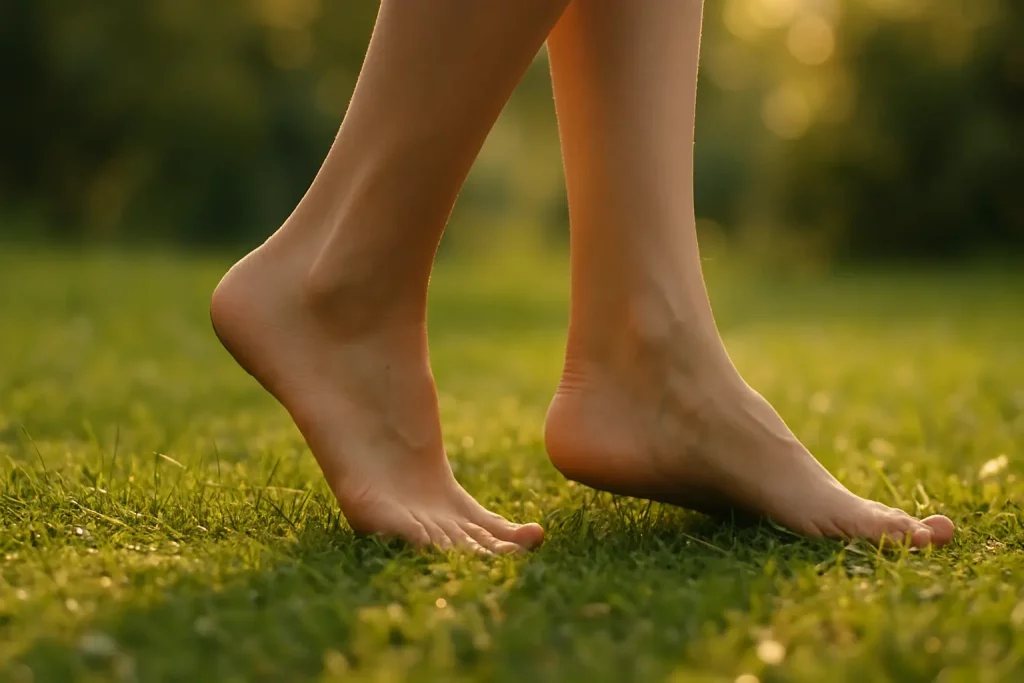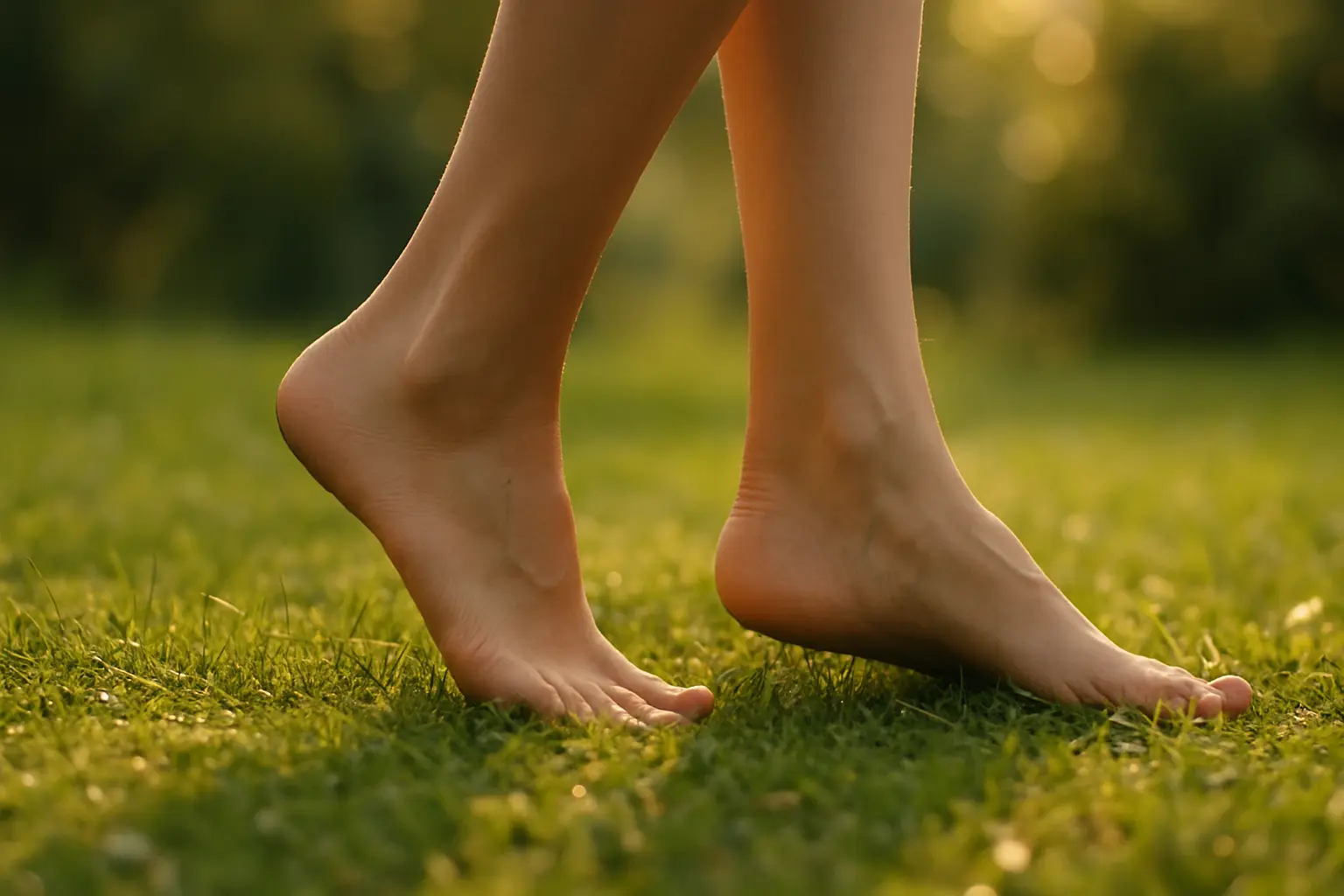Nature’s oldest therapy might just start at your feet.

👣 Feel Grounded—Literally
Imagine this: It’s Bank Holiday Monday. You’ve brewed your tea, but instead of sitting inside, you take your cup to the garden. You kick off your slippers. The grass is dewy, your feet feel the tickle, and for the first time in days… you breathe. Deeply.
That simple barefoot moment might be doing more than just making you smile. It could be regulating your blood flow, reducing stress, and even helping your body heal. No yoga mat required.
“Turns out, your feet aren’t just for walking—they’re wired for wellness.”
Let’s walk you through (pun intended!) what modern research is saying about the power of going barefoot, also known as earthing or grounding. It’s nature’s version of a full-body reset.
🌍 What Is Grounding, Really?
Grounding (or earthing) means making skin contact with the Earth’s surface, like walking barefoot on soil, grass, sand, or even swimming in natural bodies of water.
We evolved this way—no cushioned trainers or concrete walkways. And when we lost contact with the ground, something shifted.
MYTH-BUSTER:
“The Earth isn’t just dirt—it’s charged.”
Its surface carries a mild negative charge, and our bodies (especially when inflamed or stressed) build up positive ions. Direct contact with the Earth helps rebalance that charge.
🦶 What Science Says About Being Barefoot
We’ve gathered peer-reviewed studies that show how ditching your shoes can benefit your:
- ✅ Posture & foot strength
- ✅ Circulation & blood viscosity
- ✅ Stress levels & sleep
- ✅ Inflammation & pain
- ✅ Balance & brain-body coordination
Let’s break these down.
🧠 1. Barefoot Helps Your Brain-Body Connection
When you go barefoot, your feet can finally feel the ground. That sensory feedback goes straight to your brain, helping with proprioception—your body’s awareness of itself in space.
📚 Study Highlight:
A 2016 review found that older adults improved their balance and stability with regular barefoot activity. This can reduce fall risk, especially in aging populations¹.
Playful tip: Need to steady your nerves before a big Zoom call? Take a barefoot walk on the lawn. Your body and brain might thank you.
💪 2. Stronger Feet, Better Posture
Shoes often weaken our intrinsic foot muscles. Walking barefoot—especially on uneven ground—reawakens those muscles.
📚 Study Highlight:
A 2017 study showed participants who walked in minimalist shoes (close to barefoot) had significantly stronger foot muscles after just 8 weeks².
DID YOU KNOW?
The average shoe-wearing adult has weaker foot arch control than a barefoot 7-year-old.
❤️ 3. Blood Flow Gets a Boost
Some of the most exciting studies on grounding show that blood viscosity (thickness) improves when people are grounded.
📚 Study Highlight:
Chevalier et al. (2013) found grounding reduced blood stickiness, which may lower heart disease risk³.
MYTH-BUSTER:
“Blood gets thick from diet alone.”
Actually, stress and lack of grounding can increase it too. Grounding for just 2 hours measurably improved blood flow.
💤 4. Better Sleep and Lower Cortisol
Ever notice how you sleep better after a beach day or camping trip? It’s not just the fresh air.
📚 Study Highlight:
A 2004 study found that people sleeping grounded (via conductive mattress pads) had more stable cortisol rhythms, better sleep, and reduced pain⁴.
If your kettle could talk, it would say: “You need 7 hours of barefoot sleep, not 7 cups of chamomile.”
💥 5. Reduced Inflammation & Pain
Inflammation is at the root of almost every chronic disease. Some scientists now believe barefoot contact with Earth may reduce inflammation via a constant flow of electrons.
📚 Study Highlight:
A 2010 trial showed grounded athletes had less muscle soreness and inflammation after intense workouts⁵.
Feeling stiff? Try a barefoot cool-down lap around the garden instead of collapsing onto the sofa.
🔎 Other Curious Benefits Being Studied
- Facial circulation: Grounding improved blood flow to facial capillaries⁶.
- Mood & anxiety: Grounded subjects reported feeling calmer and more emotionally stable.
- Antioxidant effect: Earth’s electrons may neutralize harmful free radicals⁷.
- Children’s development: Kids who play barefoot outdoors may develop better balance and motor skills.
⚠️ Hold Up—Is Barefoot Always Safe?
Not always! Watch out for:
- 🔹 Glass or sharp objects
- 🔹 Animal droppings or parasites
- 🔹 Cold, wet conditions (avoid long barefoot walks in winter!)
Safe barefoot spaces:
🏡 Back garden
🏖️ Clean sand
🌳 Parks (avoid areas with litter)
🧘 Indoors on cork, wood, or grass mats
🍃 How to Start Grounding Gently
You don’t have to go full Tarzan. Here’s a gentle barefoot plan for beginners:
| Week | Time Barefoot Daily | Surface Ideas |
|---|---|---|
| 1 | 5 minutes | Grass or mat |
| 2 | 10 minutes | Sand, garden path |
| 3 | 15–20 minutes | Forest floor, lawn |
| 4+ | 30+ minutes | Mix & explore safely |
🎯 Conclusion: Reconnect for Real
In a world buzzing with Bluetooth, fluorescent lights, and rubber soles, grounding is a call to return to what your body knows best—natural contact with the Earth.
Even just 10 minutes barefoot in your garden can begin to rebalance your body’s systems. So go on—ditch the socks, brave the lawn, and let your feet remember what they were made for.
Your feet weren’t made for foam—they were made for freedom.
🍵 Want to Pair It with Herbs?
Try Quidian Naturals’ calming recipes for stress and inflammation support. Check our Recipes Page for tea blends, compresses, and foot soak ideas to pair with grounding.
References
- Gabel, C.P. et al. (2016). Barefoot vs shod gait and proprioception. Gait & Posture.
- Holzer, M. et al. (2017). Effects of minimalist shoes on foot muscle strength. Journal of Foot and Ankle Research.
- Chevalier, G. et al. (2013). Blood viscosity improvements via grounding. Journal of Alternative Medicine.
- Ghaly, M. & Teplitz, D. (2004). Cortisol and sleep improvement via grounding. JACM.
- Brown, D. et al. (2010). Grounding reduces muscle soreness. Journal of Alternative Medicine.
- Chevalier, G. (2015). Grounding improves facial blood flow. Health Journal.
- Oschman, J. (2007). Electrons as antioxidants. Journal of Alternative and Complementary Medicine.
